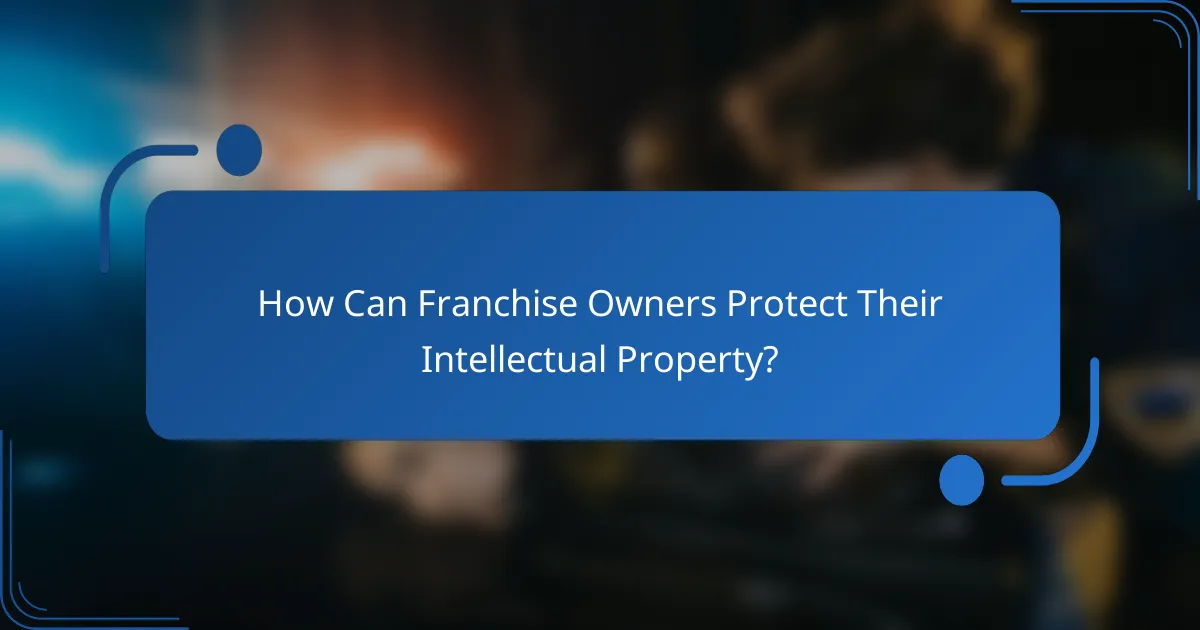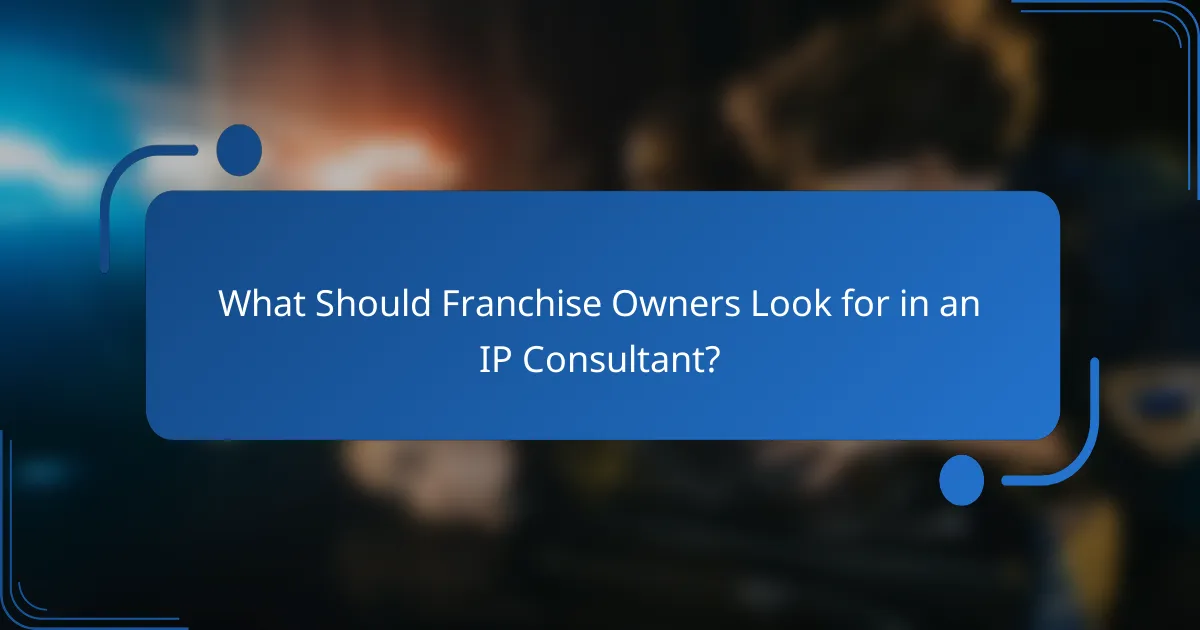Franchise owners encounter unique intellectual property challenges that can significantly affect their business and brand reputation. By leveraging intellectual property consulting services, they can effectively safeguard their investments, enhance brand value, and navigate the complexities of legal compliance. Implementing strategic measures such as IP audits and trademark registrations is essential for protecting their intellectual assets.

What Are the Key Intellectual Property Challenges for Franchise Owners?
Franchise owners face several intellectual property challenges that can impact their business operations and brand integrity. Understanding these issues is crucial for protecting their investments and ensuring compliance with legal standards.
Trademark registration issues
Trademark registration is vital for franchise owners to secure exclusive rights to their brand names and logos. However, navigating the registration process can be complex, often requiring thorough searches to avoid conflicts with existing trademarks.
Franchise owners should consider engaging legal experts to assist with the application process and ensure that their trademarks are properly classified. Delays or errors in registration can lead to significant financial losses and brand dilution.
Copyright protection concerns
Copyright protection is essential for safeguarding original works, such as marketing materials and training manuals. Franchise owners must ensure that their copyrighted materials are registered to enforce their rights effectively against unauthorized use.
Additionally, they should be aware of the limitations of copyright, as it does not cover ideas or concepts, only the expression of those ideas. Regular audits of their materials can help identify potential vulnerabilities.
Franchise agreement complexities
Franchise agreements often contain intricate clauses related to intellectual property rights, which can lead to misunderstandings. Franchise owners must carefully review these agreements to understand their rights and obligations regarding trademarks and copyrights.
It’s advisable to consult with legal professionals who specialize in franchise law to clarify any ambiguous terms and ensure compliance with local regulations. This proactive approach can prevent disputes and protect brand integrity.
Infringement risks
Infringement risks pose a significant threat to franchise owners, as unauthorized use of their intellectual property can harm their brand reputation and financial standing. Franchise owners should monitor the market for potential infringements actively.
Implementing a robust enforcement strategy, including sending cease-and-desist letters and pursuing legal action when necessary, can help mitigate these risks. Regular training for franchisees on IP rights can also enhance awareness and compliance.
Licensing disputes
Licensing disputes can arise when franchise owners grant third parties permission to use their intellectual property. These disputes often stem from disagreements over terms, royalties, or the quality of goods and services provided under the license.
To avoid such conflicts, franchise owners should establish clear licensing agreements with detailed terms and conditions. Regular communication with licensees can help maintain positive relationships and ensure compliance with the agreed-upon standards.

How Can Franchise Owners Protect Their Intellectual Property?
Franchise owners can protect their intellectual property (IP) by implementing a combination of strategies that safeguard their brand, products, and proprietary information. Key methods include conducting IP audits, using non-disclosure agreements, registering trademarks and copyrights, and actively monitoring for infringement.
Conducting IP audits
Conducting IP audits involves systematically reviewing all intellectual property assets to identify what needs protection. Franchise owners should assess trademarks, copyrights, patents, and trade secrets to ensure they are properly documented and secured. Regular audits can help in recognizing potential vulnerabilities and ensuring compliance with relevant regulations.
To perform an effective IP audit, create a checklist that includes all IP assets, their registration status, and any associated risks. This process should ideally be conducted annually or whenever there are significant changes in the business structure or offerings.
Implementing non-disclosure agreements
Non-disclosure agreements (NDAs) are crucial for protecting sensitive information shared with employees, partners, or vendors. By requiring parties to sign NDAs, franchise owners can legally prevent the unauthorized sharing of proprietary information. This is particularly important during negotiations or collaborations where confidential data is exchanged.
When drafting NDAs, ensure they clearly define what constitutes confidential information and outline the duration of the agreement. Avoid overly broad terms that may lead to disputes; specificity helps enforceability.
Registering trademarks and copyrights
Registering trademarks and copyrights is essential for legally protecting brand names, logos, and creative works. Trademarks can be registered with the United States Patent and Trademark Office (USPTO) or equivalent bodies in other countries, while copyrights protect original works such as marketing materials and training manuals.
Franchise owners should prioritize registering their trademarks as soon as they establish their brand identity. This not only provides legal backing against infringement but also enhances brand recognition in the marketplace. Consider consulting with an IP attorney to navigate the registration process effectively.
Monitoring for infringement
Monitoring for infringement is vital to ensure that no one is unlawfully using your intellectual property. Franchise owners should regularly search for unauthorized use of their trademarks and copyrighted materials online and in the marketplace. This can involve setting up alerts or using specialized monitoring services.
Establish a response plan for addressing any instances of infringement, which may include sending cease-and-desist letters or pursuing legal action. Being proactive in monitoring helps maintain the integrity of your brand and prevents potential losses from unauthorized use.

What Are the Benefits of Intellectual Property Consulting Services?
Intellectual property consulting services provide franchise owners with essential support in managing and protecting their intellectual assets. These services help enhance brand value, mitigate risks, and ensure compliance with relevant regulations.
Expert guidance on IP strategy
Consultants offer tailored advice on developing a robust intellectual property strategy that aligns with your franchise goals. They assess your current IP portfolio and identify opportunities for growth, ensuring you maximize the value of your trademarks, copyrights, and patents.
Franchise owners can benefit from expert insights on market trends and competitor strategies, allowing them to make informed decisions about their IP assets. This guidance is crucial for navigating complex legal landscapes and optimizing your franchise’s competitive edge.
Risk management and compliance
Effective risk management is vital for franchise owners to protect their intellectual property from infringement and misuse. Consulting services help identify potential risks and develop strategies to mitigate them, ensuring compliance with local and international IP laws.
Consultants can assist in conducting IP audits to evaluate your current protections and recommend necessary improvements. This proactive approach minimizes the chances of costly legal disputes and enhances your franchise’s overall stability.
Cost-effective solutions
Intellectual property consulting can lead to cost-effective solutions for franchise owners by streamlining processes and reducing unnecessary expenditures. By leveraging expert knowledge, you can avoid common pitfalls that lead to costly mistakes in IP management.
Consultants often provide scalable services that cater to different budget levels, ensuring that even small franchises can access valuable IP support. This flexibility allows you to invest wisely in your intellectual property while maximizing returns.
Enhanced brand protection
Protecting your brand is essential for franchise success, and intellectual property consulting services play a key role in this process. Consultants help you establish strong trademarks and copyrights that safeguard your brand identity against infringement.
Additionally, they can assist in monitoring the market for potential violations and provide strategies for enforcement. This proactive approach not only protects your brand but also enhances consumer trust and loyalty, which are critical for franchise growth.

What Should Franchise Owners Look for in an IP Consultant?
Franchise owners should seek an intellectual property (IP) consultant with specialized knowledge in franchise law, proven success in similar cases, and a clear understanding of the unique challenges faced by franchises. Additionally, transparent pricing models are essential to ensure that costs align with the services provided.
Experience in franchise law
When selecting an IP consultant, prioritize those with substantial experience in franchise law. This expertise ensures they are familiar with the specific legal frameworks and regulations that govern franchises, which can vary significantly by region.
Consultants with a background in franchise law can better navigate the complexities of trademark registration, licensing agreements, and franchise disclosure documents, which are critical for protecting your brand.
Track record of successful cases
A strong track record of successful cases is a key indicator of an effective IP consultant. Look for professionals who can provide examples of past clients, particularly those in the franchise sector, and the positive outcomes they achieved.
Request references or case studies that highlight their ability to resolve disputes, secure trademarks, or navigate licensing negotiations. This evidence will give you confidence in their capabilities.
Understanding of industry-specific challenges
Franchise owners face unique challenges, such as maintaining brand consistency across multiple locations and managing franchisee relationships. An effective IP consultant should demonstrate a deep understanding of these issues and how they impact intellectual property management.
For instance, they should be able to advise on how to enforce brand standards while respecting franchisee autonomy, ensuring that your intellectual property remains protected without alienating franchise partners.
Transparent pricing models
Transparent pricing models are crucial for franchise owners to budget effectively for IP consulting services. Look for consultants who provide clear, upfront pricing structures without hidden fees.
Consider asking for a breakdown of costs associated with different services, such as trademark searches, registration, and ongoing compliance support. This clarity will help you make informed decisions and avoid unexpected expenses down the line.



